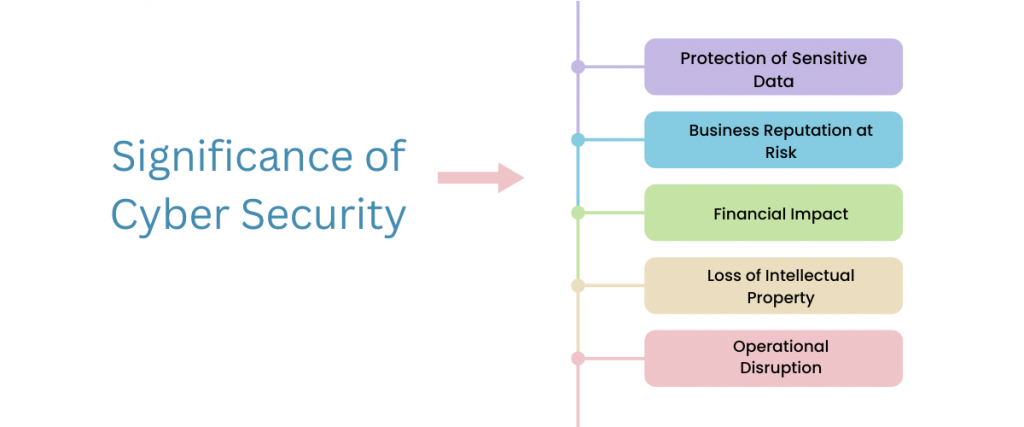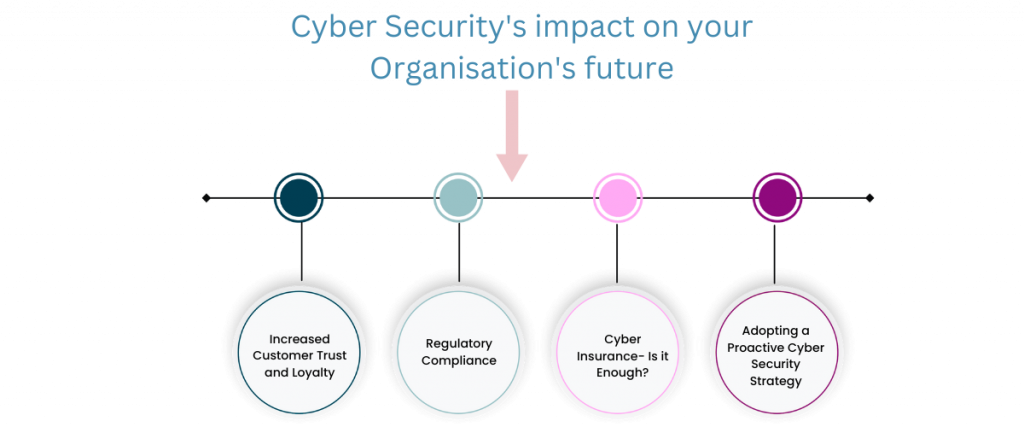The Impact of Cyber Security on Your Business

Introduction
With initiatives like Made in India and Digital India positively impacting the entire economy, India is making significant progress towards its digital goals. However, because it relies on linked systems and networks, cyber security is a problem. India is one of the most often targeted nations in cyberspace, therefore protecting vital resources depends on its cybersecurity resilience.
In 2023, India had over 1.2 billion internet users. According to the reports As of June 2024, there were around 350 million active Unified Payments Interface (UPI) users in India
What is Cybersecurity?
Cybersecurity is any tools, procedures, and regulations used to stop or lessen the effects of cyberattacks. Cybersecurity aims to defend against ransomware, other malware, phishing scams, data theft, and other cyber threats by safeguarding computer systems, apps, devices, data, financial assets, and individuals.
Need of Cybersecurity
Cybersecurity is a business need in the current digital world, not just a trendy term. Every organisation, no matter how big or little, government or private sector is vulnerable to cyberattacks. Protecting sensitive data is more crucial than ever due to the rise in data breaches and cyberattacks. However, what are the precise effects of cyber security on your company, and why should you be concerned?
We’ll go into great detail about the growing significance of cyber security, the associated threats, and how it may impact your organisation’s future in this blog.

- Protection of Sensitive Data
As per the reports, organisations in India faced 3,201 attacks per week. At the heart of every business lies valuable data—customer information, financial records, intellectual property, and more. A breach in cyber security can expose this sensitive information to hackers, leading to financial losses, legal consequences, and a damaged reputation. No matter what kind of business big or small, private or government data breaches are common.
Website intrusion and malware propagation, malicious code, phishing, distributed denial of service attacks, website defacements, unauthorised network scanning/probing activities, ransomware attacks, data breaches, and vulnerable services were among the 1,158,208 incidents that CERT-In handled in 2020.
Example: Imagine a retail company suffering a cyber attack where thousands of customers’ credit card information gets leaked. The immediate impact isn’t just the loss of trust but also potential legal repercussions under data protection laws.
- Business Reputation at Risk
In the era of digitalisation, reputation is crucial. A single significant cyberattack has the power to instantly damage a company’s reputation. Consumers expect businesses to protect their data, and a security breach may cause them to lose faith in the company.
Key Stat: 60% of small businesses that suffer a cyberattack shut down within six months, according to recent research. Recovering from financial and reputational harm is frequently impossible.
- Financial Impact
Cyberattacks can be quite expensive. Businesses frequently spend a significant amount of money recovering from attacks, from paying for ransomware to dealing with the aftermath of data breaches. In 2023, the average cost of a data breach was an astounding $4.45 million, according to IBM.
Businesses that violate data privacy laws like the CCPA or GDPR may be subject to fines in addition to recovery expenses. Avoiding these financial pitfalls can be achieved by making sure your company complies with cyber security regulations.
- Loss of Intellectual Property
Hackers don’t just target personal data—they also aim for valuable business information. Trade secrets, proprietary processes, and research & development data are goldmines for cybercriminals. A breach can lead to a company losing its competitive edge, especially if that information is sold or used by a rival company.
- Operational Disruption
Imagine one day arriving at work to find all of your systems locked by ransomware. Your employees are unable to communicate with customers, execute orders, or access emails. Cyberattacks have the potential to completely shut down your company.
Project delays, decreased client satisfaction, and decreased productivity can all result from operational disturbances. Your company might lose thousands, if not millions, of dollars for every minute of delay.

- Increased Customer Trust and Loyalty
Conversely, putting money into strong cyber security measures can boost client confidence. Your customers’ loyalty is increased when they are certain that you are protecting their data. Your brand can gain credibility by communicating openly about your security protocols and adherence to industry standards.
- Regulatory Compliance
Globally, governments and regulatory agencies are enforcing more stringent data protection legislation. Serious fines and penalties may result from breaking laws like the CCPA, GDPR, or HIPAA. In addition to avoiding these expenses, making sure your company complies with the law also shields it from future lawsuits.
- Cyber Insurance- Is it Enough?
Many firms are investing in cyber insurance in reaction to the growing threat of cyberattacks. This is not a replacement for strong cyber security measures, even though it can somewhat offset the monetary damages brought on by cyberattacks. The entire spectrum of harm, especially the long-term effects on reputation and customer trust, is frequently not covered by cyber insurance.
Certain online and e-learning platforms are offering free and paid diploma and cyber security certification courses.
- Adopting a Proactive Cyber Security Strategy
Cybersecurity is an ongoing activity rather than a one-time event. Putting in place a proactive cyber security plan might prevent disastrous occurrences from happening to your company. Regular vulnerability assessments, staff training, software and security patch updates, and the configuration of appropriate firewalls and encryption are all part of this.
As more businesses shift to remote work and cloud services, it’s critical to implement multi-factor authentication, encrypt communications, and routinely check systems for any unusual activity.
Conclusion
In the linked world of today, cyber dangers can affect any organisation. The question is not whether a cyberattack will happen, but rather when. Businesses may preserve customer trust, safeguard critical data, and guarantee company continuity by giving cyber security a top priority. Investing in complete cyber security is essential to the long-term viability of your company, not just a precaution.
Check out our paid and free best cyber security courses to get an edge over the competition.

